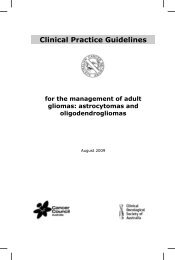Clinical Practice Guidelines for the management of locally advanced ...
Clinical Practice Guidelines for the management of locally advanced ...
Clinical Practice Guidelines for the management of locally advanced ...
You also want an ePaper? Increase the reach of your titles
YUMPU automatically turns print PDFs into web optimized ePapers that Google loves.
Psychosocial Referring to <strong>the</strong> emotional, psychological, social and spiritual aspects <strong>of</strong><br />
human life.<br />
Quality <strong>of</strong> life (QOL) A person’s overall appraisal <strong>of</strong> his or her situation and wellbeing.<br />
Radiation oncologist A specialist in <strong>the</strong> treatment <strong>of</strong> cancer using x-ray techniques.<br />
Radical prostatectomy An operation which removes <strong>the</strong> prostate and <strong>the</strong> seminal vesicles. This<br />
is usually done through a cut in <strong>the</strong> lower abdomen.<br />
Radio<strong>the</strong>rapy The use <strong>of</strong> radiation as x-rays or electrons to kill tumour cells.<br />
Rectum The last part <strong>of</strong> <strong>the</strong> bowel, leading to <strong>the</strong> anus, and through which stools<br />
pass.<br />
Recurrence The re-occurrence <strong>of</strong> cancer some time after it was first treated.<br />
Reliability (<strong>of</strong> a test) The ability to measure something in a reproducible and consistent<br />
fashion.<br />
Response A change in <strong>the</strong> size or extent <strong>of</strong> disease due to treatment.<br />
Retrograde ejaculation Also called reverse ejaculation. This may occur after surgery <strong>for</strong> benign<br />
conditions <strong>of</strong> <strong>the</strong> prostate. The ejaculate travels back into <strong>the</strong> bladder<br />
instead <strong>of</strong> exiting out through <strong>the</strong> penis. This means a man is usually<br />
infertile (cannot produce <strong>of</strong>fspring in <strong>the</strong> conventional way), but he can<br />
still achieve orgasm.<br />
Scrotum A pouch <strong>of</strong> skin which contains <strong>the</strong> testicles and some o<strong>the</strong>r parts <strong>of</strong> <strong>the</strong><br />
male reproductive system. It hangs outside <strong>the</strong> body and below <strong>the</strong> penis.<br />
Secondary tumour Spread <strong>of</strong> cancer from where it began to ano<strong>the</strong>r part <strong>of</strong> <strong>the</strong> body. The<br />
secondary cancerous growths are known as metastases or ‘secondaries’.<br />
The process <strong>of</strong> spread is known as metastasis.<br />
Seminal vesicles Glands that lie very close to <strong>the</strong> prostate and produce secretions which<br />
<strong>for</strong>m part <strong>of</strong> <strong>the</strong> ejaculate.<br />
Staging The process <strong>of</strong> determining <strong>the</strong> extent <strong>of</strong> <strong>the</strong> disease. A system <strong>for</strong><br />
describing how far <strong>the</strong> cancer has spread. The most common is <strong>the</strong> TNM<br />
system described in Appendix 3.<br />
A second and older system sometimes referred to, is <strong>the</strong> Jewett system:<br />
Stage A—Prostate cancer that began and is found in <strong>the</strong> prostate only.<br />
Divided into two stages.<br />
Stage B—Prostate cancer began in <strong>the</strong> prostate and is more <strong>advanced</strong><br />
than Stage A.<br />
Stage C—Prostate cancer that began in <strong>the</strong> prostate, has grown beyond<br />
<strong>the</strong> outer layer <strong>of</strong> <strong>the</strong> prostate to nearby tissues, and may be found in<br />
seminal vesicles (glands that help produce semen).<br />
Stage D—Prostate cancer that began in <strong>the</strong> prostate and has spread to<br />
lymph nodes or far from <strong>the</strong> prostate, or to o<strong>the</strong>r parts <strong>of</strong> <strong>the</strong> body, <strong>of</strong>ten<br />
to <strong>the</strong> bones.<br />
<strong>Clinical</strong> practice guidelines <strong>for</strong> <strong>the</strong> <strong>management</strong> <strong>of</strong> <strong>locally</strong> <strong>advanced</strong> and metastatic prostate cancer<br />
140



